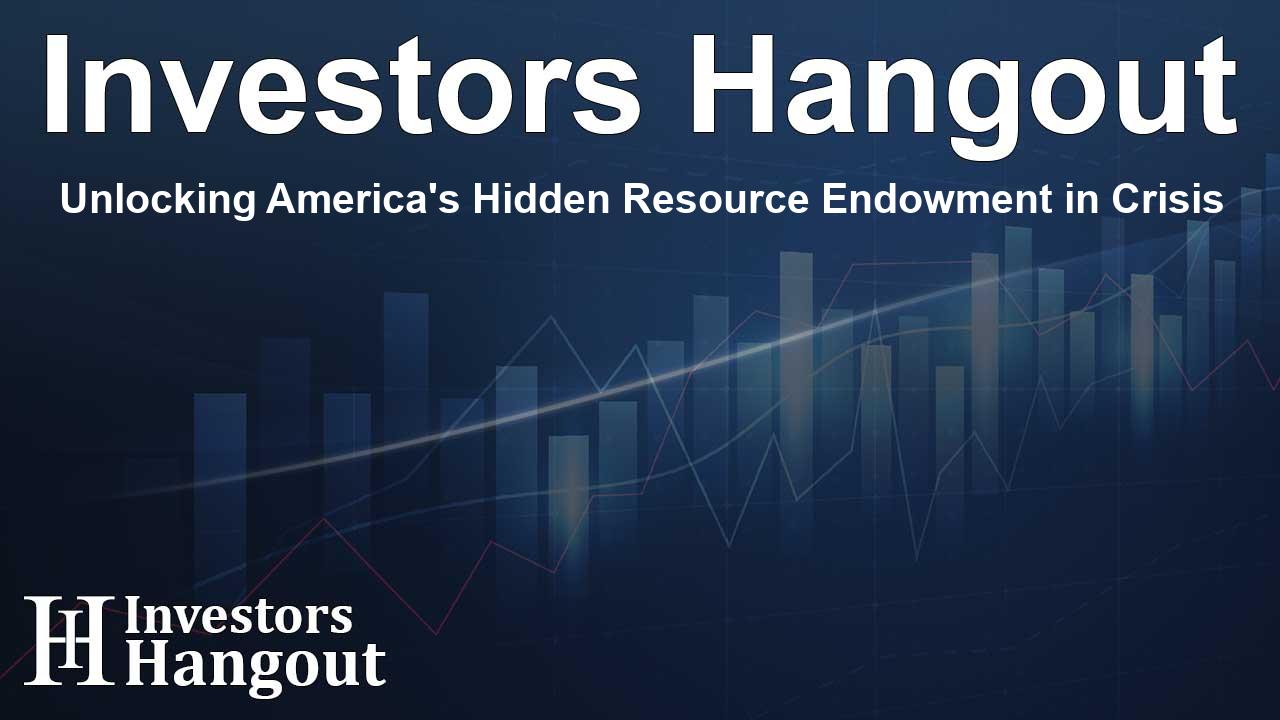Unlocking America's Hidden Resource Endowment in Crisis

China's Economic Move Shakes U.S. Industry
In recent months, the geopolitical landscape has shifted dramatically with tensions rising and global supply chains being threatened. China's recent decision to restrict exports of key minerals, used extensively across various industries, poses a significant challenge for the United States. These minerals are essential for the production of advanced technologies, including AI chips and electric vehicles, which are foundational to future energy solutions and technological innovation.
The Words of Jim Rickards
Prominent finance expert Jim Rickards, recognized for his insights and consultations with high-level government officials, has raised alarms regarding the potential repercussions of these actions. He describes this intricate situation as reminiscent of historical events like the Arab Oil Embargo of the 1970s, drawing parallels to the vulnerabilities the United States faces today. According to Rickards, without immediate action, the nation’s economy could be on the brink of a significant crisis.
A National Asset Conversation
For decades, U.S. leadership has been advocating for a decrease in dependence on foreign resources. Rickards argues that the solution may already be within reach — a hidden national asset that remains unexploited. He emphasizes that this is not merely a governmental handout but an opportunity of unprecedented scale that could lead to transformative wealth for ordinary Americans.
The Size of the Hidden Endowment
Rickards estimates this 'national endowment' could hold a value exceeding $150 trillion. To put this into perspective, he notes that it is substantial enough to resolve the national debt multiple times, potentially secure 100% ownership of every NASDAQ-listed company, and even facilitate the purchase of every private residence across the nation. The vast potential of this hidden wealth could usher in a new era of economic stability and independence.
Legal Changes Expand Access
Recent legal developments, particularly a ruling by the Supreme Court that dismantled long-standing environmental restrictions, have now paved the way for accessing these resources. Rickards stresses that the overturning of the Chevron Doctrine has removed numerous hurdles, allowing the nation to unlock its natural wealth and lessen its reliance on foreign sources, primarily China.
Shifting Wealth Trends
Emphasizing that this is not about government support like past relief packages, Rickards underscores that this presents an extraordinary chance for average citizens to thrive. He points to historical moments when shifts in policy allowed everyday Americans to capitalize on new opportunities, such as the signing of the Homestead Act in 1862, which enabled citizens to claim farmland for a nominal fee. He posits that today’s potentially lucrative opportunities could lead to a similar transformation, particularly within the stock market.
The New Age of Resource Control
Rickards asserts that unlocking America’s mineral wealth could foster the creation of new household names as companies leverage this critical resource influx. The strategic importance of these minerals cannot be understated; they are essential for powering a wide range of technologies that not only support economic growth but also strengthen national security.
Who is Jim Rickards?
With a rich background in financial advising to several governmental entities, Jim Rickards has established himself as a credible voice in navigating complex economic terrains. His previous forecasts on events like the 2008 financial crisis and the political landscape during the Trump campaign highlight his keen insight into market dynamics. Today, he warns of the critical nature of the situation described as the "American Birthright," a hidden resource endowment that could determine the nation’s economic standing amid fierce competition with China.
Frequently Asked Questions
What are the critical minerals China has restricted?
China's restrictions primarily impact minerals essential for technology production, crucial for industries like AI and electric vehicles.
What does Jim Rickards say about the potential of America's hidden endowment?
Rickards believes the hidden endowment could be worth over $150 trillion and has the potential to revolutionize the American economy.
How can America unlock its hidden resource potential?
Legal changes, like the Supreme Court’s ruling, may help eliminate barriers to accessing these valuable mineral deposits.
What historical examples does Rickards provide?
He references the Homestead Act as a transformative opportunity for American citizens that parallels the potential of current resources.
Why is national resource independence important?
Achieving resource independence is crucial for national security and economic stability, reducing reliance on foreign nations like China.
About The Author
Contact Addison Perry privately here. Or send an email with ATTN: Addison Perry as the subject to contact@investorshangout.com.
About Investors Hangout
Investors Hangout is a leading online stock forum for financial discussion and learning, offering a wide range of free tools and resources. It draws in traders of all levels, who exchange market knowledge, investigate trading tactics, and keep an eye on industry developments in real time. Featuring financial articles, stock message boards, quotes, charts, company profiles, and live news updates. Through cooperative learning and a wealth of informational resources, it helps users from novices creating their first portfolios to experts honing their techniques. Join Investors Hangout today: https://investorshangout.com/
The content of this article is based on factual, publicly available information and does not represent legal, financial, or investment advice. Investors Hangout does not offer financial advice, and the author is not a licensed financial advisor. Consult a qualified advisor before making any financial or investment decisions based on this article. This article should not be considered advice to purchase, sell, or hold any securities or other investments. If any of the material provided here is inaccurate, please contact us for corrections.
